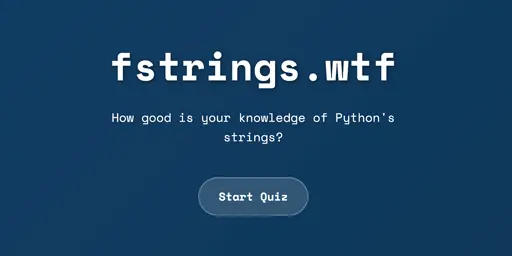Python f-string quiz
Python f-string quiz

fstrings.wtf - Python F-String Quiz

Python f-string quiz

fstrings.wtf - Python F-String Quiz

To be fair this was quite wtf-free. Mostly just unimportant formatting subtleties and stuff you'd never write.
Python definitely has bigger WTFs, like bool being an int, implicit bool conversion, implicit iteration of strings, etc.
Bool being an int was part of this.
Sure but that's orthogonal to f-strings.
Hmm: 17/26
Failures were:
= option, but once I saw it once, I guessed right a few times^ in Python, and didn't make the connection to XOR (I figured I'd need the math library or something) Most of those I missed (and many I got) I'd reject a PR over because it's not obvious enough what's going on. But I think given that, I did reasonably well.
But I learned something. Thanks for the post!
This is fun, as was the JS date one. I hope people do more.
Still though, I don't think doing well or not on these necessarily mean you're good or bad with the language.
Walrus operator. What did I just read?
I love the walrus operator:
if (x := some_function()):
do_something(x)
else:
# x is None or False or something, consider it invalid
The only thing I wish was different is adding a scope, which would make x invalid outside the block. But Python's scoping rules are too dumb to handle this case.
Walrus is more useful in a while loop.
while (data := f.read(1024)):
pass
I think my most common use case is with dictionary lookups.
if (val := dct.get(key)) is not None:
# do something with val
I've also found some cases where the walrus is useful in something like a list comprehension. I suppose expanding on the above example, you you make one that looks up several keys in a dict and gives you their corresponding values where available.
vals = [val for key in (key1, key2, key3) if (val := dct.get(key)) is not None]
Walrus operator does an inline assignment to a variable and resolves to the value assigned. If it is in a condition statement, like "if x := y:", it assigns the value of y to x then interprets the expression of the condition as of it just said "if x:". Functionally, that means the assignment happens regardless of the value of y, but the condition only passes if the value of y is "truthy", i.e. if it's not None, an empty collection, numerically equal to zero, or just False.
Your final score: 9/26
There were more nuances and surprised than anticipated. But it should be expected, because its on this website. :D But any language with duck typing and lot of magic and interpretation, and a long history of changes and additions, used in a huge variety of environments, is bound to be surprising. I am not surprised that JavaScript and Python are surprising.
!r is a thing
!s is a thing
There is some syntax for formatting a float which will completely be forgotten that'll have to be looked up.
There is nothing else worth knowing.
Now lets moan and complain about something actually important. Like repos with languishing PRs, like SQLModel.
12/26, need more practice.